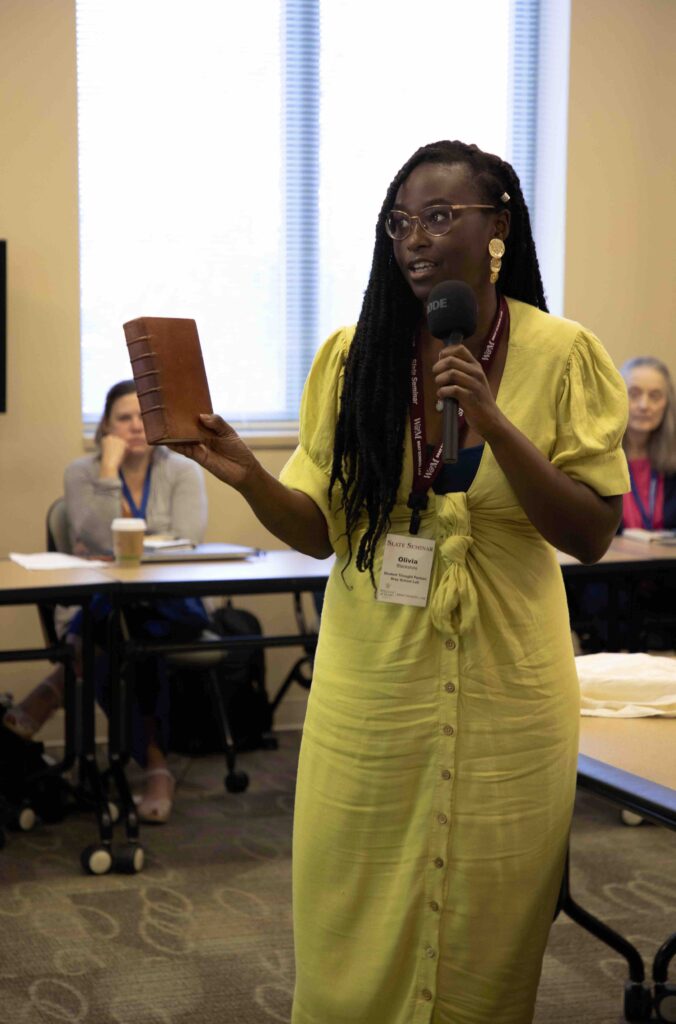By Olivia Blackshire
Under the shade trees of Nassau Street lies a treasure hidden in plain sight. A diamond in the rough of Colonial Williamsburg’s (CW) exhibitions, the African American Baptist Meetinghouse Exhibit holds a very special place in my heart. Usually, my travels up and down this living history museum end with me feeling like a walking anomaly (or, on a good day, the last Black unicorn). As one of the few college students of color coming to CW for leisure and learning, I constantly walk the line between curiosity and discomfort as I struggle to find my place within the narrative. Still, the Meetinghouse provides space to understand race, religion, and resilience in its colonial context. Its dedication to nuanced perspectives on the African American experience keeps me coming back. So, imagine my surprise when I myself would have the pleasure of researching the very same topics in the W&M Bray School Lab.
Studying religious education was never in the cards for me. I knew this opportunity would be another chance at engaging hands-on history, and it has; my transcription work on the Bray School Records Project, where the goal is making all the Bray Associate’s Virginia correspondence digitally accessible for public consumption, has made me well-versed in detailing every jot and tittle of a letter writer’s idiosyncrasies. I’ve gained a close friend in the Oxford English dictionary when tracking definitions for words lost in time, picked up the art of abbreviation, and am continuously reminded of the importance of context clues when discerning an author’s intent. But somehow, I thought the scope of my research would only extend as far as knowing the school’s direction and management—the attendance, trades learned, and who wanted the children there.

It turns out the religious aspects are deeper than shipments of Bibles or prayer books lost in the mail. And as many references there are to reverends, clergy members, doctrine, and soul-saving, I have no choice but to read for a context much greater than maintenance! Between the lines, the school’s propagation of the Christian gospel revolved around mixed (and often contradictory) motivations. On one hand, religious re-education was afoot; the Bible was not only a tool for literacy but a means of exerting control. As the foundation of the scholars’ training, the text was thought by the Williamsburg’s Bray School Trustees to have a “direct Tendency to reform their Manners,” making them good Christians and even better servants. Furthermore, there are numerous instances where men of the cloth, such as Rev. James Mayre, Rev. Jonathan Boucher, and Rev. Alexander Rhonnald, describe the Black population as incapable of learning English or core tenets of the faith, a “poor” and “unfortunate” lot who are “very dull and stupid,” displaying a total lack of respect for their capabilities. Yet the same ministers’ boast of conducting numerous Black baptisms, converting the enslaved on a diluted gospel while praising their church attendance and levels of understanding (If you’d like to see more of these texts, feel free to dive into our research portal!). A scholar’s soul only mattered when it was beneficial to them. With the constant back-and-forth between spiritual transformation and quotas to fill, it leaves one to wonder whether the messaging the scholars received was ever biblical at all.
But a chain-loving gospel wasn’t the promised land Black folk had in mind. Pliable as the Associates believed them to be, religious assimilation could never drown dreams of liberation. Like Dr. Antonio Bly says in his article “’Reed Though the Bybell’: Slave Education in Early Virginia,” I’m convinced “[t]hey, too, held within their breast the same natural rights their masters claimed for themselves.” What was meant to oppress could find other uses in religious resistance and gives us room to imagine the possibilities. With an analogical approach, the enslaved could claim stories (like the Exodus account) of earthly and spiritual freedom for themselves, as if it proved a divine declaration of their inherent value. But different faiths were practiced in secret, too. What if the language barriers or lack of comprehension was not incompetence but a willful ignorance safeguarding family wisdom? Or resistance towards an oppressive misuse of scriptures? Whatever the reason, observing such convictions asserts a dangerous dignity challenging upsetting norms in colonial Christianity.
Just like the Meetinghouse, the history of the Williamsburg Bray School holds a complex web of narratives waiting to be told. In this unexpected collision of research and religion, I can only hope my work continues to unravel intersections of race, spirituality, education, and culture, even beyond the colonial era. If we remove the scales from our eyes, slowly, surely, we can build connections to the past to see wounds we’ve left unchecked. And whether it’s descendant engagement, unpacking Sunday segregation, or going on a casual walk through CW, recognizing and responding to misunderstandings nourishes clarity for such topics. The Williamsburg Bray School scholars cry out in the wilderness! Their wisdom, strength, and resilience tell me I’m more than a quota – I belong.

Olivia Blackshire is a junior at William & Mary, as well as a Student Thought Partner and Lemon Project intern studying History and Anthropology. Her email is oblackshire@wm.edu.

Hello Olivia, u were awesome. The presentation were very interesting,
great job. I am very proud of u. Much
love auntie.
OLIVIA,
I am now revisiting this essay!
What a phenomenal report you gave!
Thanks for enlightening Americans and others who do NOT know our TRUE HISTORY!
There is much, much more for all to learn If they want to know OUR TRUE and COMPLETE STORY!
I am proud to have you as my niece!
Continue to excel keeping GOD FIRST!!
Love ❤️,
Auntie Irene G. Hines